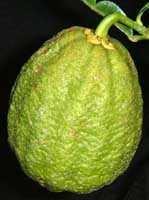
Back Papeda (citrus) French Papeda Italian 파페다 (귤속) Korean Папеда (цитрус) Serbian Papeda Swedish Papeda (Chi Cam chanh) Vietnamese 大翼橙 Chinese

Papeda or papaeda is the common name for a group of Citrus species and varieties native to tropical Asia that are hardy and slow-growing, and produce unpalatable fruit. Walter Tennyson Swingle segregated these species into a separate subgenus, Papeda, that included the Ichang lemon, yuzu, kaffir lime, kabosu, sudachi, and a number of wild and uncultivated species and hybrids. Recent genetic analysis shows the papedas to be distributed among distinct branches of the Citrus phylogenetic tree, and hence Swingle's proposed subgenus is polyphyletic and not a valid taxonomic grouping, but the term persists as a common name.[citation needed]
Because of generally slow growth and bitter, less palatable fruits than in other citruses, papeda species have only limited commercial cultivation. Some species, like ichang papeda, are used in landscaping, while others are important for rootstocking and as genome source for breeding disease-resistant and frost-hardy citrus hybrids.[1] In some cases the skin or leaves are used as a flavoring in Asian cuisine.[citation needed]
It is believed, based on molecular studies, that the citron, pomelo, mandarin and papedas were the ancestors of most hybrid citrus species and their varieties, which resulted from breeding or natural hybridization among the parental species.[2] For example, the Key lime, a hybrid between a papeda, the micrantha, and a citron, has in turn given rise to many commercial types of limes.[citation needed]
- ^ Jacob, Daniel (30 June 2014). Citrus Fruits. Oxford Book Company. pp. 48–. ISBN 978-93-5030-190-6.
- ^ "International Citrus Genomics Consortium". University of California. Archived from the original on 2015-02-01. Retrieved 2009-10-04.
© MMXXIII Rich X Search. We shall prevail. All rights reserved. Rich X Search